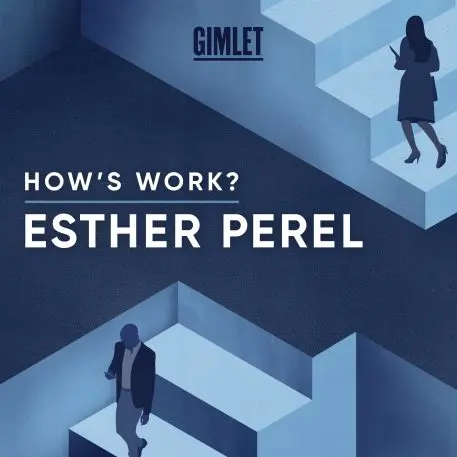Relationship expert Esther Perel rose to fame as the author of 2006 book Mating in Captivity, and as host of the hit podcast Where Should We Begin?, which brings listeners into her office to eavesdrop on a counseling sessions between couples. In a new podcast series, How’s Work?, out tomorrow, the Belgian psychotherapist turns her attention to relationships in another setting: the workplace.
The format of this new show will be familiar to fans of Where Should We Begin? Each episode follows Perel as she counsels a pair of individuals who work together—sometimes coworkers, sometimes boss and employee—about issues in their relationship. We spoke with Perel about workplace culture, emotional intelligence, and how your childhood can affect your relationship with your boss.
This interview has been edited and condensed for clarity.
Fast Company: Why did you decide to address relationships in the workplace?
Esther Perel: We all carry narratives from our childhood, our community, our family, our schools, our religion, and they influence the way we communicate. [They influence] the way we deal with conflict [and how] we establish expectations for relationships. [They influence how we] experience trust, and whether we see the world as a place where we have to be self-reliant or as a place where we are interdependent with others.
In any case, all these relational skills that we have don’t just disappear when people come to work. I have worked as a therapist for 35 years with people who have work-related concerns. All I did was change the context.
FC: So do the skills you work on with couples apply in the workplace as well?
EP: I think the relational skills that I teach individuals and couples are equally, if not more important, in today’s workplace. And while I have been doing this for a long time, I think what changed is not me; what changed is the workforce. The workplace has opened itself up: Relational skills are not seen as just soft skills or feminine skills in contrast to the real bottom line. Relational skills have become the new bottom line.
FC: How have you seen changes in technology impact the people you counsel?
EP: On the one hand, we have increased productivity and speed and efficiency. On the other hand, [that change] also comes with a certain kind of vulnerability around relational touch points. At every board meeting, people want to talk about retention, feedback, engagement, commitment—words that have always existed but have profoundly changed meaning.
When we think of retention today, it’s very different [from] when your grandfather [would] go to work and stay in the same factory for his entire life. Now, people want a sense of belonging, and they also want to move around every two years. What’s interesting is that the very people who are building robots are the ones who are demanding not to be treated as such. We want the efficiency that comes with the digital, but we are all talking about the problems that [it] engenders, as well.
FC: In the episode I listened to, you looked at how the childhoods of two people affect their working relationship. How do you see personal lives or personal experiences bleeding into work relationships?
EP: I love the fact that you use the word bleeding because it’s often what it does—and sometimes it bleeds unconsciously. People are not even aware of how much their relational diary travels with them. I like to start with some fundamental questions. [I like to examine] whether people have a worldview where you have to rely on yourself . . . that will influence how you ask for help, how you show people when you don’t know anything, how much you trust that other people will want to do good for you. Your previous experiences can affect how you see self-reliance versus interdependence.
One of the questions I ask people at events is, “how many of you send a portion of your salary home?” If the answer is yes, that’s how you know that those people are not just working for themselves. The fruit of their labor is shared by their family. These people are differently motivated because they feel a sense of responsibility—their work is not just feeding them, it’s feeding a few other people.
I also ask “how many people here chose their profession completely on their own because they could do whatever they want?” Because there are economic issues, and that’s where world views and family norms intersect with each other. [Everyone] comes with a history of trust and a history of betrayal.
FC: How important are personal relationships in the workplace?
EP: Fundamentally, I think that the quality of our relationships determines the quality of our lives. And I have said this about romantic relationships, but I think the same is true at work. The quality of your work life depends on the quality of the relationships. Even if you have a good job, no amount of money, or purpose, or even free food is going to compensate for a poisonous relationship. I’ve spent many years sometimes working with people who were obsessing about somebody every night before going to bed, feeling like their boss, their manager, their colleague, the person next to them that was plaguing them had intruded on their life.
FC: How can we cultivate emotional intelligence in the workplace?
EP: The best tool we can cultivate is relational self-awareness. There are two questions you can ask: Do you have a sense of how you act, how you are perceived, and the role that you play on your team? Do you understand the fundamental importance of complementarity in relationships? That notion of complementarity is that you can be what you are and do what you do, because there’s somebody else that is doing the other things that you’re not doing. Communication always matters, but communication doesn’t just mean talking and saying things; it’s defined by your ability to accept different opinions and not turn everything into a black and white or right and wrong [situation].

EP: Relational intelligence is also about how you welcome new people, and how you say goodbye to people. . . . If people join a team and nobody even notices that they joined, or if people leave and nobody calls them after they’re gone, there’s something going on at the company. . . . Those rituals tell you a lot about the relational intelligence of the whole organization. To develop an understanding of where you stand, you ask yourself that question. The second thing you need is feedback, but the problem sometimes is that it’s hard to get good feedback.
FC: How can you receive and deliver feedback in a group?
EP: If you’re on a team, it helps to discuss the team’s pain points. Generally, when you have relational conflicts it’s because you have too little or too much of something: too little guidance, too little supervision, too little support or too much intrusion, too much micromanagement. You don’t have to talk about specific people because when you’re in a group, when one person raises a concern, it impacts everyone. Generally, if one person is feeling overwhelmed, they are not the only person who feels overwhelmed, for example. When you speak out in a group, you generally speak to the feelings and the experiences of others, and it removes the stigma.
FC: If you’re interviewing for a job, are there any things to look out for in order to judge whether it’s a good workplace for you?
EP: Pay attention to how the people are saying hello to each other. Pay attention when they enter the room. Pay attention to how much they suddenly become quiet when the superior comes in. Pay attention to the stuff in between the lines. Pay attention to the unusual questions that they may ask, how much they’re interested in you as a person and not just your technical proficiencies and skills. Ask about how people take breaks, or how they celebrate birthdays, or how they treat vacation time. Ask how the company deals with someone having a baby. Don’t ask what your day is going to look like—try and learn what your life is going to look like.
Recognize your brand’s excellence by applying to this year’s Brands That Matter Awards before the early-rate deadline, May 3.
